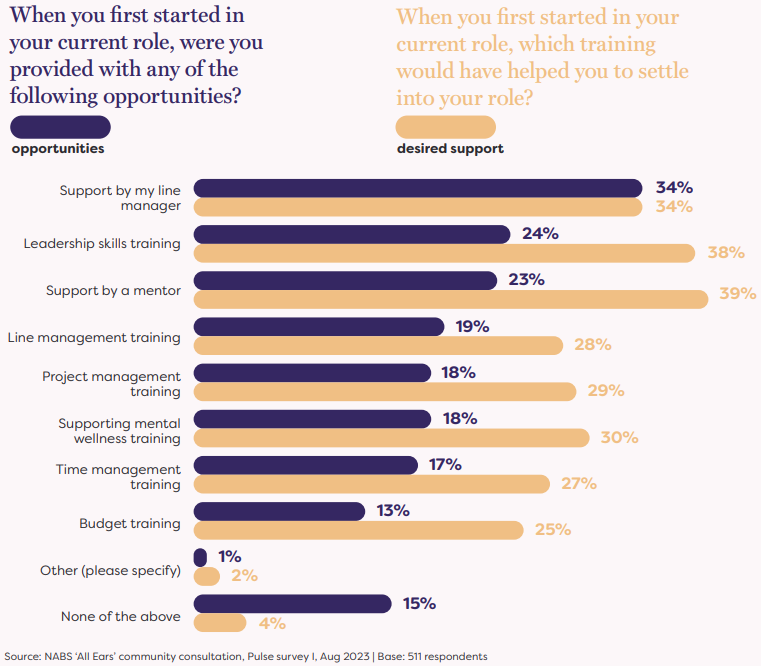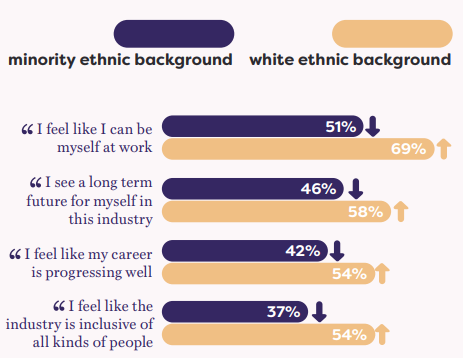One in three unable to talk about mental wellness

More than one-third (35%) of ad industry professionals surveyed by Nabs say they feel unable to discuss mental wellness in the workplace.
The industry well-being charity’s All Ears report shows that for many, stigmatisation of mental health is still a barrier to getting help in the workplace.
Half of C-suite execs and department heads said they still worry that discussing their mental health could impact their careers.
Meanwhile, nearly four in 10 (39%) of early-career respondents said they would be unlikely to share their mental-health experiences over concerns regarding their colleagues’ reactions.
This is particularly heightened for LGBTQ+ respondents, of which just under half (46%) said they feel they can be themselves at work, compared to nearly seven in 10 (69%) of straight respondents.
Stress and burnout ‘normalised’
The report also found that feelings of stress, anxiety, and burnout are prevalent across the industry and at all levels, with 71% of respondents agreeing that mental wellness needs more focus within the industry.
“Stress and burnout are normalised in our industry,” admitted one middle manager. “It’s a cultural problem. It’s so endemic that it’s tricky to gauge when someone is tipping into real crisis because everyone is stressed. We need to stop glorifying extreme output and long hours.”
Demand for Nabs’ services has increased by 66% over the past three years, with a particular spike during and after the Covid-induced lockdowns.
“It’s clear from the consultation that, despite significant inroads and efforts to change the conversation and support the mental wellness of our sector, there is much for us all to do,” said Nabs CEO Sue Todd. “Policies are not enough. We need consistent good practice, and we need to work harder to create environments where all voices are heard and all individuals are comfortable to seek help when they are struggling.”
‘The theory is there, but not the practice’
The report notes that while many businesses in the industry have instituted “supportive policies and initiatives” around mental health, the gap between policy and practice is nevertheless widening.
Respondents highlighted a “disconnect” between the institution of policies and their actual “embedding” into their organisation. The report notes that organisations have “over-estimated” the impact of the work being done.
The findings echo a conversation at this month’s Future of Media conference in London, where Nabs director of wellbeing services and culture change Lorraine Jennings-Creed highlighted said “gaps” between policies and actions.
One middle manager explained that while he receives a lot of internal comms from HR on what mental wellbeing support is available, “the reality is that, when you are involved in a high pressure client project (for example, a new business pitch), the behaviour of the teams running these projects does not reflect mental wellbeing considerations. So, the theory is there, but not the practice.”
This has particularly had an effect on diverse members of staff, who feel especially unsupported. “We are doing the work to recruit diverse talent,” said one senior leader, “but not the work to protect people once they are inside our businesses.”
‘Boundaries between work and home more tricky’
The report suggests that too many people are being funnelled into management positions without needed mental wellness training. Less than one in five (18%) line managers said they received such training, and less than a quarter (24%) received any leadership skills training whatsoever.
That is despite the fact that 42% of overall respondents said the first person they would take any mental health concerns to would be their line manager, rather than, say, a trained mental health first aider.

This is especially salient as tension remains between management and staff over the perception of hybrid-working models within the industry.
All Ears’ respondents both criticised work-from-home policies as having a negative effect on mental health, such as through the taxing nature of back-to-back video calls and a blurring of boundaries between work and life, and also praised the ability to work-from-home as providing greater flexibility and a more manageable home-life blend.
“Working from home is seen as privilege, one that you should be grateful for, and you are expected to show your side of the deal and be flexible and contactable,” said one respondent. “It makes boundaries between work and home more tricky.” Others complained of endless Teams meetings leading to a lack of availability to get tasks done.
On the other hand, some senior leaders reasoned the change to hybrid has made parenting significantly easier, and one middle manager also noted that productivity hasn’t declined through work-from-home practices.
“We have proved we can do it,” they said. “But now there is an itchiness from higher ups to get us in the office more.”
Mandated returns to the office were found to be a common source of stress among staff.
However, senior managers did not necessarily express confidence in work-from-home practices. Just 18% of senior managers said they believe they have the tools to manage higher workloads, and just 27% said they believe they have the right tools and practices to collaborate effectively through hybrid working models.
Time to redesign our workplaces for true post-Covid flexibility
‘We have a lived experience gap, not a generation gap’
The report found that gaps in understanding around mental health are not necessarily generational, but have more to do with difference in personal experience.
For example, those with a minority ethnic background were significantly less likely to report seeing a future for themselves in the media industry, to view the industry as inclusive, and to feel like their personal careers are progressing well.

Jennings-Creed added that “Mental wellness is a connecting thread, not a competing issue.”
“Despite a good understanding across industry about the importance of mental wellness, it can lose out on the list of priorities to commercial and other more measurable issues,” she continued. “The danger implicit in this is that it is precisely in those situations where commercial pressure is likely to be greatest that acute mental wellness issues are most likely to emerge.”
All Ears collected responses over a five-month period this year in response to the Ad Association’s All In survey data, which found a third of industry professionals are dealing with stress and anxiety that affects their work. Nabs surveyed 1,200 media and marketing professionals, including 67 in a number of focus group conversations.
Podcast: How media should support women managing their work-life ‘blend’





